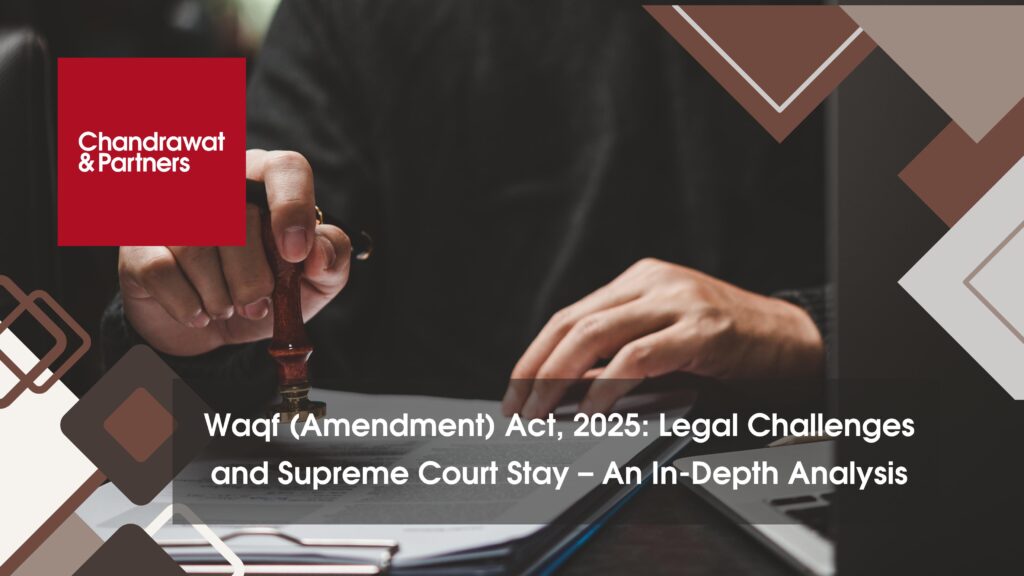Home > Recent Judgements > Waqf (Amendment) Act, 2025: Legal Challenges and Supreme Court Stay – An In-Depth Analysis
April 21, 2025
Waqf (Amendment) Act, 2025: Legal Challenges and Supreme Court Stay – An In-Depth Analysis
The Waqf (Amendment) Act, 2025, has emerged as a significant and controversial reform in India’s socio-religious legal landscape. Aimed at strengthening governance, ensuring gender representation, and promoting transparency in the administration of Waqf properties, the amendment has drawn both praise and criticism. As of April 17, 2025, the Supreme Court of India has intervened by clubbing several petitions against the Act and imposing a temporary stay on alterations to Waqf properties, thereby intensifying the ongoing legal and public discourse around this legislation.
Background: What is Waqf?
Waqf is an Islamic endowment of property, typically for religious or charitable purposes. In India, Waqf properties are managed by State Waqf Boards under the supervision of the Central Waqf Council, governed by the Waqf Act, 1995. These properties, including mosques, graveyards, schools, and commercial real estate, represent significant socio-religious and economic assets.
Highlights of the Waqf (Amendment) Act, 2025
The 2025 Amendment introduced several key changes to the existing Waqf Act, including:
- Mandatory Gender Representation:
One of the hallmark provisions of the Act is the mandatory inclusion of women in the composition of Waqf Boards. This move was intended to empower women and enhance inclusivity in the decision-making process.
- Enhanced Transparency and Accountability:
The Act mandates digitization of all Waqf property records, regular audits, and greater scrutiny of lease agreements and encroachments. This aims to curb widespread allegations of mismanagement and illegal transfers.
- Central Oversight:
The amendment strengthens the role of the Central Waqf Council in overseeing state boards and allows for periodic reviews and interventions if state bodies are found lacking in performance.
- Denotification Clause:
A contentious provision empowers the government to denotify Waqf properties considered non-beneficial to the community or improperly registered. Critics argue that this could be misused to usurp or reclassify religious lands.
Legal Challenges and Supreme Court Intervention
Following the enactment of the law, multiple petitions were filed in various High Courts and the Supreme Court, challenging the constitutional validity of several provisions. The petitioners – comprising minority organizations, legal scholars, and community representatives – raised concerns over:
- The denotification powers granted to the government.
- Alleged violation of Article 26 of the Indian Constitution (freedom to manage religious affairs).
- Potential encroachment on religious autonomy and misuse of property rights.
- Lack of adequate consultation with stakeholders before passage.
On April 17, 2025, the Supreme Court took note of the rising legal unrest and clubbed all related petitions for joint hearing. Recognizing the gravity of the matter, the Court issued the following directions:
- The Union Government was directed to submit a consolidated reply to all petitions within one week.
- A status quo order was issued, barring any denotification, transfer, or alteration of Waqf properties until the next hearing.
- The Court emphasized the need to balance reform and religious autonomy, urging restraint from all parties involved.
Implications and the Road Ahead
The Supreme Court’s interim stay is being seen as a critical pause, offering a breathing space to reassess the legislative intent, the practical challenges, and the constitutional boundaries of the Waqf (Amendment) Act, 2025.
- For the Government: This is an opportunity to engage with stakeholders, defend the Act’s reforms as pro-accountability, and assure the Court that minority rights are being respected.
- For the Petitioners: The stay validates their concerns and opens the door for detailed legal scrutiny of the law’s provisions.
- For Waqf Boards and the Community: Uncertainty looms, but the judicial oversight provides some relief. The outcome of this case could reshape how Waqf properties are governed for years to come.
Conclusion
The Waqf (Amendment) Act, 2025, sits at the intersection of reform and religious rights. While its goals of transparency and inclusiveness are laudable, the backlash reflects deep-rooted concerns about autonomy, property rights, and religious freedom. As the legal battle unfolds in the Supreme Court, the nation watches closely – the verdict could set a landmark precedent in the balance between state reform and constitutional freedoms.
For more information or queries, please email us at
enquiries@chandrawatpartners.com




